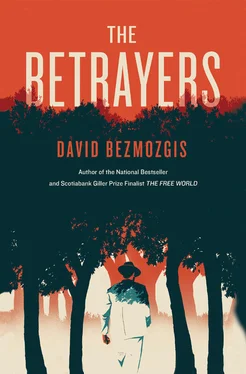Kotler entered the address of Yedioth Ahronoth and found essentially the same images. He scanned the photographs for Benzion’s face. In their uniforms and helmets, a number of boys resembled Benzion, more scholars than warriors, but none was Benzion himself.
Kotler felt a redoubled urgency to get home, if only, during such a turbulent moment, to breathe the same air as his countrymen. It was disgraceful to be away.
— Is there anyone there to speak with? Kotler asked Leora.
She nodded her head but said nothing. She was no longer pressing buttons, simply listening and waiting.
— I’d sooner pay the money than wait. To have the tickets would put my mind at rest.
— Another minute, Leora said. If they don’t answer.
Kotler could see it was now a matter of principle. There was life: a quick leap from practical to principle. But he did not press her on it. If it had become a matter of principle, grounds for her to assert herself, it was because of him. She’d conceded one thing after another on this trip.
— Very well, Leoraleh, another minute, he said.
He used his minute to navigate from the news site to his e-mail account. He’d last consulted it in Kiev more than a day ago. Then, there had been a block of messages forwarded from his office. Media requests. Now he saw more of the same. As well as a few notes from disparate friends, expressing, he assumed, some manner of concern or support or, perhaps, censure. He didn’t open them. He scrolled quickly through the list, looking for anything that might require his immediate attention. His eye stopped on a message whose sender was identified as Amnon. Its subject line was a single Hebrew word: Chaval —“Too bad.” Kotler clicked on it. The message contained no other text, only a picture of himself sitting on the park bench behind the Israel Museum. In his lap lay the sealed envelope with the photographs. Behind him rose the carob tree and the plum-colored, twilit sky. But beside him, where Amnon had been sitting, the bench was vacant. Any trace of Amnon had been meticulously erased, as though he had never been there. The only indication that there was something amiss about the photo was that a little lark had been placed atop Kotler’s bald head. The bird perched there, making him look ridiculous. Like some dotty old fool or comic Saint Francis.
Kotler deleted the message.
He continued to scroll through the list and saw, one followed by the other, a message from Benzion and one from Miriam. Benzion’s had been sent a little more than an hour before. And Miriam’s only a few short minutes ago. Which meant that she would have pressed the button to speed it through the circuitry while Kotler was sitting in the Internet café. Thus he could envision her in their apartment, facing the computer screen, in the room they had designated as the office, the window at her back with a view of Mount Scopus, and on the wall above the computer screen the framed black-and-white portraits of his parents and her parents, taken around the same time though thousands of Soviet kilometers apart, both couples young and unsmiling, humbly dressed, embarking on new lives in the jagged aftermath of the war, daring to look with their dark eyes to the future. How would he fare under their scrutiny and judgments if they were here today? No, that was too simplistic, too self-critical. After all, their parents, like most people, had seen and sampled life’s full panoply. So, the truer question was, how would he and Miriam both fare under their scrutiny and judgments?
The subject line of Miriam’s message was blank. Benzion’s read: Psalm 137:5. Kotler opened it first and discovered that the message consisted solely of the subject line. As if Benzion had composed it either very hastily or very cryptically. Kotler knew the Psalms reasonably well. He’d had occasion to read them in Moscow in his refusenik days, and in prison camp — from the Russian Bible kept by the Jehovah’s Witness — he’d read them even more closely. With their calls for God’s strength and protection in the face of wicked and ruthless foes, they’d seemed especially pertinent. He found in the Psalms, if not quite religious conviction, then something more vital to him, a sense of continuity with his people from deepest antiquity, with King David himself, who was made palpable through his verse as a man of flesh and blood racked by the same fears as Kotler was. They encourage one another in an evil matter; They converse of laying snares secretly; They ask, who would see them? And from King David he felt linked to the cumulous generations of his forebears, bowed under the harsh decree, who had also sought comfort in these words. From this history of Jewish resistance he had drawn his strength. The title of his memoir, Song of Ascent, Kotler had taken from the Psalms, and its epigraph from Psalm 126: They that sow in tears shall reap in joy.
Off the top of his head, Kotler could not recall Psalm 137, and certainly not its fifth verse, but it was a problem that was easily solved. It no longer required a Bible. He typed the query into the computer and was met by the well-known opening:
By the rivers of Babylon,
There we sat down, yea,
We wept,
When we remembered Zion.
Its fifth verse read:
If I forget thee, O Jerusalem,
Let my right hand forget her cunning.
So he had Benzion’s answer. The son had gone against the wishes of the father. It was nothing new. It accounted for the greater part of human history. Still, it didn’t make it less of a mistake in Kotler’s eyes, only a mistake for which he shared the blame. After the disgrace the father had visited upon the family, could the son have chosen differently? After such a thing, could he have been expected to quell his conscience and abide by his father? Even without the scandal, Kotler did not know what Benzion might have done. He actively believed in the things Kotler regarded as only ornamental, contextual. For Benzion, the God of Israel was the giver of the law. For Kotler, God and His law merely provided the inflection for the Jewish people. To be a Jew, one did not need to worship, only to be suitably inflected. To resonate at the Jewish semitone. Kotler knew many such people. Not only godless but God-averse. It was such people, after all, who had founded the country. It was from them that Kotler had drawn inspiration when he was his son’s age, a dissident in Moscow. Weizmann, Ben-Gurion, Jabotinsky, Trumpeldor. For them the Bible was more a source of poetry and ancestral lore and less a guidebook for keeping house. But their example was waning. For Miriam and Benzion, the poetry and the lore were inextricable from the housekeeping. It was divine, which meant all or nothing. It was holy scripture, not a document to prove hereditary land claims. Which was very well. This line of thinking had always existed and there was space for it. But, increasingly, it left less and less space for anything else. Less space, as loath as Kotler was to admit it, for him and those like him. But wasn’t that the dissident’s lot? He should have been inured to it by now. Too much logic and so always the misfit.
Kotler looked to Leora, who was still holding her phone to her ear in silence.
— Benzion refused orders, he said.
Leora turned her face away from the phone.
— How do you know? The news?
— I don’t know if it has made the news yet. He sent me a message. A verse from the Psalms. Its implication seems clear enough. We should order the tickets.
Leora nodded reluctantly, prepared to concede, but then a voice sounded through the handset.
— Hello, yes, hello, Leora said.
She was drawn into the conversation, which left Kotler to return to the computer screen and Miriam’s waiting message. He saw her name, Miriam Kotler, composed in Hebrew letters, as though she were asserting in the most unmitigated sense — before God and man — her connection to him. In those two words — her name — was enfolded their entire history together, a history of nearly four decades. From the time they had met in Moscow as fledgling Zionists, as Boris Kotler and Milena Ravikovich, to her becoming Milena Kotler on their wedding day. It was Milena Kotler, in Russian, that she had written on the first envelopes she mailed to him from Israel. Later, after his detention and the start of her campaign on his behalf, she became Miriam. For the duration of his sentence, that was the name he saw, again in Russian, on the post he was fitfully granted. Only after his release did he encounter this Hebrew version, spelled out on the directory of the apartment building where she had insisted on listing them both, Baruch and Miriam Kotler, years before there had been any tangible hope of a reunion.
Читать дальше












